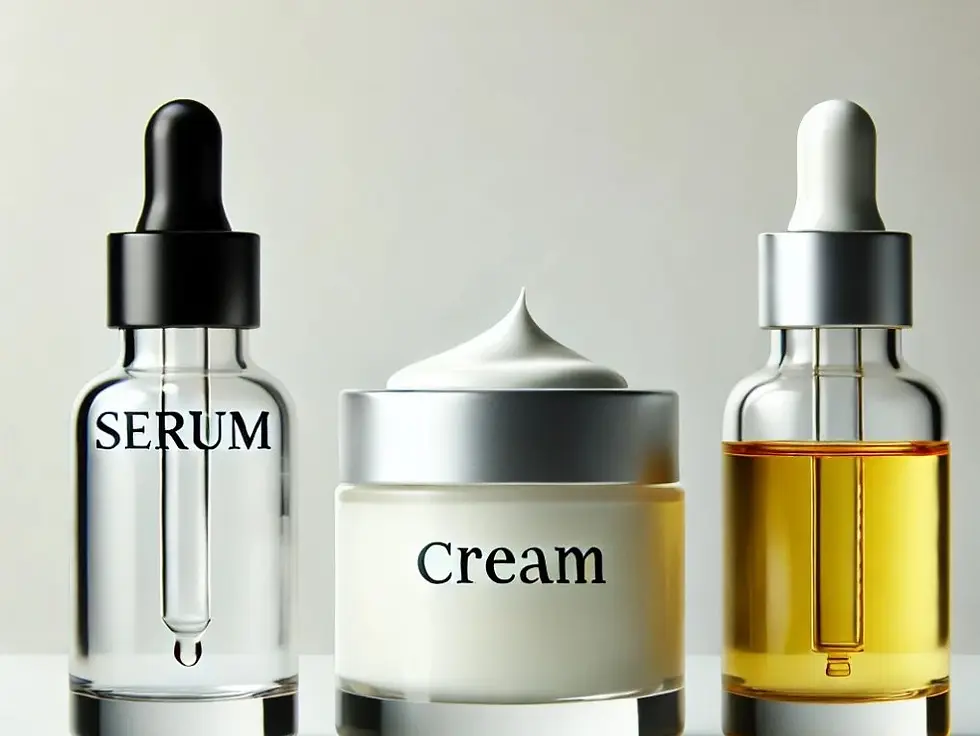Does Genetics Play a Role in the Speed of Skin Aging?
- Angéline Poulouin
- Jan 10, 2025
- 3 min read
Updated: May 24, 2025
Genetics plays a fundamental role in the speed and manner in which the skin ages. This process, known as intrinsic or biological aging, is determined by the genes inherited from our parents. However, intrinsic aging interacts with extrinsic factors (sun exposure, pollution, smoking, etc.) that also influence the appearance and health of the skin. Here is a detailed analysis of the role genetics plays in skin aging.
Intrinsic Aging and Its Link to Genetics
Intrinsic aging is an inevitable process dictated primarily by our genes. It begins in our twenties, although it often becomes visible only in our thirties or forties. Genetics influence several aspects of skin aging, such as:
Collagen and Elastin ProductionGenes regulate the production of collagen and elastin, two essential proteins that provide firmness and elasticity to the skin. In some people, their genes lead to a faster decline in these proteins, accelerating the appearance of wrinkles and sagging skin.
Cell RenewalThe ability of skin cells to regenerate is genetically programmed. As we age, this process slows down, making the skin thinner, more fragile, and less capable of repairing itself after damage.
Melanin ProductionGenes also influence melanin production, the pigment that protects the skin from UV rays. Fairer skin, often less rich in melanin, is more prone to sun damage and premature aging.
The Role of Telomeres in Skin Aging
Telomeres are structures at the ends of chromosomes that protect DNA during cell division. With each division, telomeres shorten.
Link to Genetics: The initial length of telomeres and the rate at which they shorten are partly determined by genes. Shorter telomeres are associated with faster cellular aging, including skin cells.
Effects on Skin: When telomeres become too short, skin cells can no longer divide, leading to a loss of firmness, increased wrinkles, and reduced skin repair capacity.
Genetic Differences Based on Ethnicity
Genetic characteristics vary by ethnicity, influencing how skin ages:
Darker Skin: With higher melanin concentrations, it is better protected against UV rays, delaying the onset of wrinkles and pigmentation spots.
Fairer Skin: More sensitive to sun damage, it often shows signs of aging earlier.
Skin Thickness: Genes also determine the natural thickness of the skin. Thicker skin resists sagging and wrinkling better.
Genetic Predispositions to Certain Conditions
Genes can predispose individuals to certain skin conditions that affect aging:
Rosacea and Redness: People genetically predisposed to these conditions may have more fragile, inflammation-prone skin.
Psoriasis or Eczema: These chronic skin disorders can accelerate the deterioration of the skin barrier and contribute to premature aging.
Interaction Between Genetics and Environmental Factors
Although genetics play a key role, they do not act alone. Environmental factors and lifestyle choices can amplify or mitigate genetic effects:
Example 1: Someone genetically predisposed to rapid aging can slow this process through sun protection, a diet rich in antioxidants, and proper skincare.
Example 2: Conversely, someone with "good genes" can accelerate their skin’s aging through unprotected sun exposure or smoking.
How to Care for Skin Based on Genetics
Analyze Family History: Observing how family members’ skin ages can provide insights into one’s genetic predisposition.
Prevention: While genes cannot be changed, habits such as daily sunscreen use, proper hydration, and antioxidant-rich products can slow extrinsic aging.
Dermatological Consultation: Genetic testing for skin aging can provide personalized recommendations to optimize care.
Genetics plays a significant role in the intrinsic aging of the skin, influencing collagen production, cell renewal, and protection against external aggressors. However, lifestyle choices and environmental factors are just as crucial. While we cannot change our genes, a proactive approach based on prevention and tailored skincare can help preserve youthful skin longer.
Let me know if you'd like additional details! 😊


.jpg)




Comments